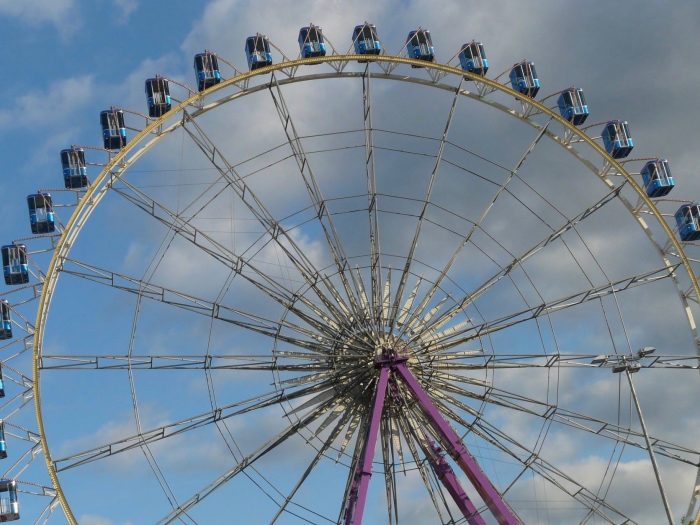

Natalie Babbitt describes August as the very top of summer, “the highest seat of a Ferris wheel when it pauses in its turning”. There are marked times in our lives, such as birthdays that end in zeros or major life transitions, when we embody this August moment she so perfectly characterizes— that place in between moving and more moving, where an enchanted stillness lives. A kind of silent pause that wasn’t asked for, but nonetheless, points to the location where the worlds of youth and the worlds of wisdom meet in the messy mix of our lives.
It’s in that poignant moment, atop the Ferris wheel of life, where we look around and realize, perhaps deeply for the first (or for the thousandth time), that we are all buckled in on the same ride. Strapped into our seats, feeling either isolated from one another, or rather, recognizing that we are all connected to one another in a breathtakingly beautiful way. The hub of the wheel holds each of our spokes in perfect proximity. One carriage shifts and the others feel it. One goes up, and the others circle around.
Knowing that the movement of one affects the movement of all—what is it that continues to compel us to see one another as “other”? To fight, to hurt, to hate one another? We can draw lines in the sand, create markers that indicate the “enemy”, and then get seduced by the notion of bucket-smashing those who don’t agree with us. Smashing those who threaten us. I know it’s tempting to justify pushing someone else’s bucket into a tail spin. But when we take a step back, it seems undeniable that bucket-smashing actually throws the entire wheel into further chaos. It destabilizes all of us.
Pretending that we are separate is way too risky. It is out of touch with the reality that we share the same hub. And, finding common ground may, in fact, be essential to our individual and collective happiness—whether we are talking politics of the country, challenges in our local communities, or even dynamics in our own homes.
Sounds great, but exactly how do we find common ground, especially with those who we vehemently disagree with? The Dalai Lama might suggest that we recognize our shared vulnerabilities with the bucket-goers next to us (for instance, we all want to feel security, we all want love). In my own struggle with this, I notice that I can only feel safe enough to let in such compassion when I trust that doing so won’t mean I have to give up my vision. In other words, my compassion doesn’t mean relinquishing my perspective and it doesn’t mean that I condone theirs. It simply means that I’m applying a lens to help me understand why the other bucket got to where they got to.
Such a perspective lays the foundation for us to exercise both compassion as well as good boundaries. Compassionate boundaries. These may be the golden ticket that lets us hold our own vision and still relate with respect and kindness to those we disagree with.
Is there a chance that we can pause together today, finding a space that is expansive enough to hold disagreements, big enough to hold the fear, the worries, but bring our minds back to the truth— that our connection to one another is real, and finding common ground is vital, now more than ever? I’m not saying this is easy, or even that I know how to in every situation, but I value this deeply as one of the few viable pathways to sustaining peace of mind and peace in our world.
Browse Front PageShare Your IdeaComments
Read Elephant’s Best Articles of the Week here.
Readers voted with your hearts, comments, views, and shares:
Click here to see which Writers & Issues Won.







